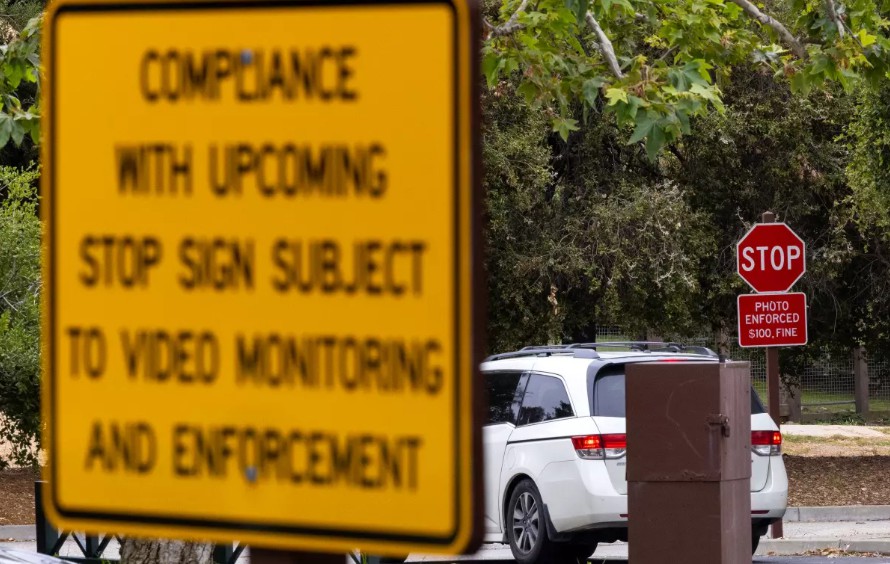They film you rolling through stop signs and fine you $100. One SoCal agency’s $1-million idea
Source of this article, the Los Angeles Times, May 19, 2024

Stop signs and warnings to not violate them or face a $100 fine in Temescal Gateway Park in the Santa Monica Mountains in Pacific Palisades.
The citation that Andrew Rice received in the mail looked like a traffic ticket, including a photo of his license plate. But the mail didn’t come from any police or city agency he recognized.
Back in July, one of his adult kids visited Temescal Canyon park near Pacific Palisades. A camera recorded Rice’s Prius rolling through a stop sign at the park’s parking lot, resulting in a $100 fine for Rice, the registered owner of the car.
Yet it was not a violation of the vehicle code. It won’t affect Rice’s driving record, and it was not a traffic citation. Instead, it was a fine for violating park rules, issued by the Mountains Recreation & Conservation Authority — a local public agency dedicated to protecting local parkland.
Rice is not alone. The agency collects more than $1 million a year from such tickets.
“This agency that is ostensibly all about land preservation and public access, things I totally support, is sending fake $100 tickets to the people they claim to serve,” Rice said.
But the citations are real and can have real consequences. If they’re not paid on time, the debts are sent to a collection agency, and unpaid fines can affect credit scores. Rice missed the initial notice in the mail, he said, possibly tossing out the letter thinking it was junk mail. He discovered the fine in March, seven months later, after it was sent to a collection agency.
Like Rice, thousands of other drivers are receiving similar citations from the Mountains Recreation & Conservation Authority after visiting their parks. The controversial practice was first reported by KTLA-TV.
Tasked with preserving and managing open space and parkland, the Mountains Recreation & Conservation Authority is a local government organization that manages more than 75,000 acres of land and more than 100 parks. It was created in 1985 in a partnership between state and local park and recreation agencies.
With seven cameras installed in four parks, the organization issues about 17,000 citations a year, bring in about $1.1 million every year, said Dash Stolarz, spokesperson for the Mountains Recreation & Conservation Authority. That means that the agency tasked with preserving free open space, parkland and coastal access issues about 47 stop sign citations a day.
“It’s set up like a turnstile to generate money,” Rice said. “It’s a money machine for the park.”
The cameras were installed at Temescal Gateway Park, Marvin Braude Mulholland Gateway Park, Top of Topanga and Franklin Canyon Park in 2007.
Stolarz, spokesperson for the agency, said the cameras and citations were not installed to make revenue but as a safety measure and to enforce the park rules.
“How are you supposed to keep people safe if you can’t enforce the rules of the park,” she said. “If you don’t get the cars to stop, everyone thinks they don’t have to stop.”
The $1.1 million generated from the fees is only a fraction of the agency’s multimillion-dollar budget. This year, the 2023-24 budget showed the agency expected to see more than $77 million in grants. The money from the fees goes back into maintaining the parks, she said.
However, the citations generated more revenue than parking fees ($920,000), more than double the revenue from leases and licensing ($460,000), and nearly as much as the funds generated from filming fees ($1.25 million), according to the agency budget.
With the thousands of citations issued each year, however, Rice said he feels the $100 fine is similar to a “regressive tax on their user base.”
“For a lot of people who go there to go hiking or have a picnic, $100 is a lot of money,” he said.
Rice is also concerned that, like him, many people toss out the initial citation thinking it is junk mail.
He’s also concerned that, unlike traffic cameras used by cities and law enforcement agencies, the tickets are issued to the owner of the vehicle, not the driver. Because the citations are rule violations, instead of traffic tickets, the park agency is not required to meet vehicle code requirements for operating traffic cameras and identifying drivers when it issues the citations.
Red light cameras, for example, require law enforcement agencies to confirm the identity of the driver when tickets are issued.
The citations also state that, despite the similarity, it’s “not issued for any violation of any provision of the California Vehicle Code.”
“Neither the issuance of this Citation nor its non-payment will be reflected in your official driving record,” it reads. Not paying, however, can result in “an adverse report on your credit rating.”
The Mountains Recreation & Conservation Authority has been sued by ticketed motorists over the citations and was named in a class-action lawsuit challenging the validity of the tickets.
In July 2015, however, the California 2nd District Court of Appeals ruled that the agency could issue the tickets under the Public Resources Code and it can enforce its own rules to manage park lands.
“This [ruling] affirms that the MRCA has the authority to enforce its ordinance, including the photo enforcement program,” Stolarz said in an email.
In an interview, Stolarz said tickets are issued by park rangers for violations such as parking, speeding and stop sign violations.
She added that the cameras were placed in locations identified in traffic studies as “hot spots,” or with repeat violations.
The intersections with cameras, she said, also include multiple signs that alert drivers about the stop signs and the camera enforcement.
“It’s very well marked,” she said.



0 Comments